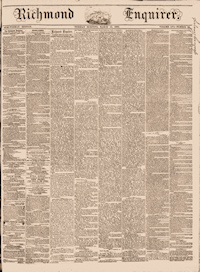March 7, 1861; Richmond Enquirer
Our readers have seen and, we feel confident, most anxiously perused the inaugural address of Mr. Lincoln. Never was an inaugural looked for with such deep interest, for never did a President hold the fate and destiny of the Union so completely in his hands. A dismembered and severed Union, a people discordant, dissatisfied and almost belligerent, looked to Mr. Lincoln for some word of hope, some hint of peace. With a deliberation which the Convention of Virginia certainly will appreciate, Mr. Lincoln has spoken, and with a frankness at least commendable, he has told ‘the people of the United States’ that there cannot and shall not be any separation. – He says:
‘It follows from these views that no State, upon its own mere motion, can lawfully get out of the Union; that Resolves and Ordinances to that effect are legally void; and that acts of violence within any State or States, against the authority of the United States, are insurrectionary or revolutionary, according to circumstances. I therefore consider that in the view of the Constitution and the laws, the Union is unbroken; and, to the extent of my ability, I shall take care, as the Constitution itself enjoins upon me, that the laws of the Union be faithfully executed in ALL the States.’
Here, then, is an end to peaceable separation.
Mr. Lincoln has no ambiguity as to his purposes, and he coolly tells the States that have seceded, that if in the future anybody should be hurt, that they must not charge upon him; for he says:
‘In doing this there needs to be no bloodshed or violence, and there shall none, unless it be forced upon the National Government.’
He does not stop with generalities, but enters into details of purpose about which there can be no misunderstanding.
‘The power confided to me will be used to hold, occupy and possess the property and places belonging to the Government, and to collect the duties and imposts, but beyond what may be necessary for these objects, there will be no invasion, no using of force against or among the people anywhere. Where hostility to the United States in any interior locality shall be so great and so universal as to prevent competent resident citizens from holding the Federal offices, there will be no attempt to force obnoxious strangers among the people for that object. While the strict legal right may exist in the Government to enforce the exercise of these offices, the attempt to do so would be so irritating and so nearly impracticable with all, that I deem it better to forego for the time the uses of such offices.’
His conclusion is pathetically emphatic. ‘In your hands, my dissatisfied fellow-countrymen, and not in mine, IS THE MOMENTOUS ISSUE OF CIVIL WAR. You can have no conflict without being yourselves the aggressors.’ Give me up my forts, pay me my revenue, return my arsenals and arms, are not enemies, but friends. ‘With the affectionate embrace of Box, he says: passion may have been constrained, it must not break our bands of affection.’
Mr. Lincoln evinces his attachment to Virginia by a repeated use of a familiar rallying cries of the majority of the Convention. Like them, he, too, is for taking time. He says and so does the majority of the Convention – ‘Nothing valuable can be lost by taking time.’ He, too, is opposed to ‘and haste.’ ‘If there be an object,’ says Mr. Lincoln, ‘hurry any of you in hot haste to a step which you would never take deliberately, that object will be frustrated by taking time, but no good object can be frustrated by it.’ This is not as clear as it might be, but, perhaps, it is as clear as Mr. Lincoln intended to make it.
To ‘Precipitate Action,’ Mr. Lincoln is decidedly opposed. He says:
‘If it were admitted that you who are dissatisfied, hold the right side in the dispute, there is still no single good reason for PRECIPITATE ACTION.’
Will it not strike the people of Virginia with astonishment that Mr. Lincoln should advise and counsel the very identical course which this Convention has pursued; that he should use the same terms, the very cant phrases that are heard from the lips of every submissionist in this Convention? How often have the people of Virginia read in submissionists’ journals, and heard from submissionists’ lips the words ‘time,’ ,’haste,’ ,’action?’ Now Mr. Lincoln returns literally the poisoned chalice to their lips, and threatens them with all the power of the Government if they do not wait.
This coincidence of language between Virginia submissionists and the Illinois coercionists has deeper meaning that the mere identity of phrase, the purposes, the ends of both are the same, the one betrays, the other conquers, but both design the disgrace and dishonor of the State; they are both the enemies of the State and should share the same fate from its true and loyal sons.
